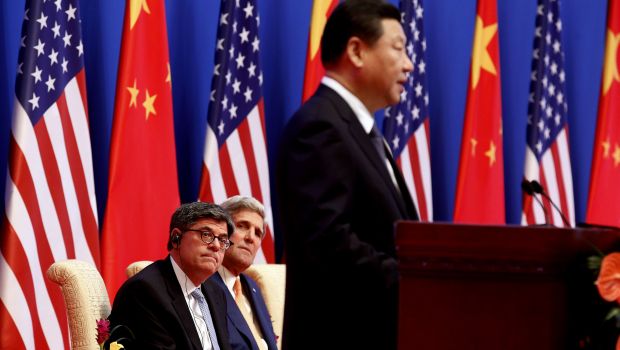
US Treasury Secretary Jack Lew (L) and Secretary of State John Kerry (C) listen as China’s President Xi Jinping (R) addresses a Joint Opening Session of the US-China Strategic and Economic Dialogue in Beijing, July 9, 2014. (Reuters/Jim Bourg)
Beijing, AP—The United States and China vowed Wednesday to improve their economic and security cooperation, saying they wouldn’t let persistent differences over maritime claims, cyberhacking and currency hamper a relationship critical to global peace and prosperity.
Opening this year’s “Strategic and Economic Dialogue,” Chinese President Xi Jinping stressed the need to avoid confrontation between nations accounting for a quarter of the world’s people and a third of the global economy.
His theme was largely echoed by Secretary of State John Kerry and Treasury Secretary Jack Lew, leaders of an American delegation that also included Federal Reserve chair Janet Yellen and three other Obama administration Cabinet members.
Nevertheless, the next two days are a test of whether the annual high-level talks can produce tough compromises or just serve as a venue to talk about greater cooperation.
Washington hopes to secure closer coordination with China against climate change, an end to Chinese industrial cyberespionage against American companies and stricter rules governing territorial claims in Asia’s contested, resource-rich seas.
Xi made clear China wouldn’t be pushed around.”The vast Pacific Ocean has ample space to accommodate our two great nations,” he said through an interpreter.
Differences between the US and China, he said, were “natural.” Yet he said the only path forward was respect for each other’s sovereignty and to “refrain from imposing your will or model on other side.” And in a reference to China’s territorial disputes with its neighbors, he said the US must respect Chinese “territorial integrity.”
American allies Japan and the Philippines, as well as Vietnam, have become increasingly worried by Chinese efforts to drill for oil or assert authority in waters they consider their own. China also has tried to enforce control over contested airspace.
For its part, the US says it takes no sides on whose claims are valid. But its effort to establish rules for settling the disputes has gained no ground with Beijing.
From Washington, President Barack Obama released a statement hailing the 35th anniversary of US-Chinese diplomatic relations and referenced a pledge he made with Xi at a summit last year in California to establish a “new model” of superpower cooperation.
In Beijing, in the Diaoyutai guest house where former Secretary of State Henry Kissinger’s secret talks in the 1970s laid the groundwork for today’s relationship, Kerry emphasized “a new model is not defined in words.”
“It is defined in actions,” Kerry said. “The new model will be defined by the choices we can make together.”
All told, US and Chinese officials will canvass 60 topics through Thursday. Economic friction centers on the valuation of China’s currency and claims by American companies of unfair market restrictions in China—issues raised by Lew in his opening remarks. Strategic discussions include the threat posed by nuclear-armed North Korea.
On climate change, the world’s two biggest carbon emitters announced eight new projects aimed at capturing and storing carbon, and setting up more efficient energy grids.
They also agreed to stronger fuel efficiency standards for cars and trucks and to study gas use in industrial boilers.
US and Chinese officials repeatedly declared friction in their relationship unavoidable. The US has the world’s biggest economy and strongest military, but China’s economy is set to surpass the US in the coming decades and its armed forces are rapidly gaining strength.
It’s a recipe, Xi and Kerry both acknowledged, that has consistently led to conflict in the past. Both said careful management of their differences could avert a similar fate.
Human rights didn’t appear to be a focus of the first day’s talks.
In a snub to Washington, a well-known Tibetan writer and recipient of a State Department award for courage, Tsering Woeser, was placed under house arrest along with her husband late Tuesday. Tsering Woeser said she was invited to a US Embassy dinner Wednesday, but now couldn’t attend.
No US official on Wednesday explicitly mentioned the cyberhacking dispute between Washington and Beijing that has simmered since the US indicted five Chinese military officers on charges of stealing trade secrets from American companies’ computers.
China demands the charges be withdrawn; it has no plans to extradite the men. And it has refused to allow a US-Chinese working group on cybersecurity to hold any further meetings until the issue is resolved.
“We both depend on an open global trading system in which workers and companies can compete on a level playing field,” Lew said. He stressed the need to protect intellectual property and see China move toward a market exchange rate for its currency.
